You'll get the most longevity from your perfumes by using natural fixative oils like jojoba, sweet almond, or fractionated coconut oil. These carriers help stabilize volatile scent molecules and slow down evaporation, extending fragrance life up to 24 hours. Add a few drops of vitamin E oil as a natural preservative, and consider incorporating sandalwood or benzoin for extra staying power. Discover how these ancient aromatic secrets can transform your fragrance experience.
Understanding Base Notes: Essential Natural Fixatives
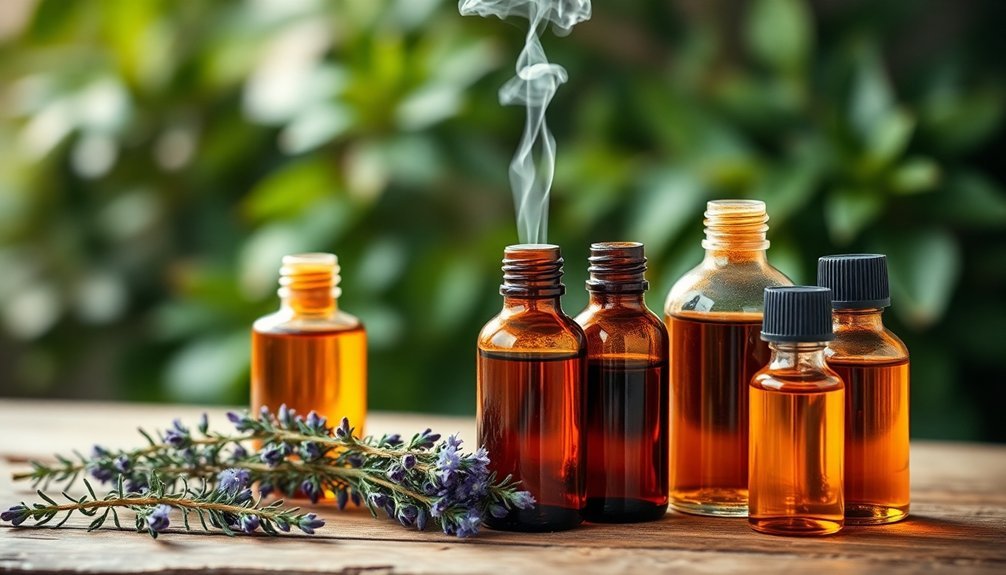
While synthetic fixatives dominate modern perfumery, natural base notes offer a rich palette of options for creating long-lasting fragrances.
You'll find that essential oils like patchouli, vetiver, and sandalwood serve as powerful fixatives, anchoring your perfume's lighter notes while adding their own distinctive aromas.
Natural resins and balsams are equally valuable in extending your fragrance's longevity. Frankincense essential oil provides exceptional stabilizing properties in oriental blends.
Labdanum adds depth with its leathery scent, while benzoin contributes a warm, vanilla-like sweetness.
If you're looking for additional natural options, consider cistus for its resinous qualities or clary sage for its herbaceous stability.
These base notes, containing the largest molecules, evaporate slowly and can last up to a day on your skin.
When properly blended, they'll provide the foundation that keeps your perfume balanced and long-lasting.
Jojoba Oil: The Ultimate Fragrance Stabilizer
You'll find jojoba oil remarkable for its unique ability to mimic your skin's natural oils, making it an ideal carrier for fragrances that blend seamlessly with your body chemistry.
Its natural preservation properties help stabilize volatile scent molecules, ensuring your perfumes maintain their integrity over time.
When you apply jojoba oil with your favorite fragrance, you're extending the life span of the scent while creating a more personalized aromatic experience that lasts throughout the day. Research shows that jojoba oil delivers slower evaporation rates compared to other carrier oils like sweet almond oil.
Mimics Human Skin Oil
Jojoba oil's remarkable similarity to human sebum makes it nature's perfect fragrance stabilizer. When you apply it to your skin, it creates a natural, protective layer that works just like your body's own oils to hold fragrance compounds in place.
You'll notice that unlike other carrier oils, jojoba won't leave your skin feeling greasy. Instead, it absorbs quickly and adapts to your skin type, whether it's dry or oily. Scientific tests demonstrate that jojoba oil provides slower evaporation rates compared to other natural oils.
This versatility means you'll get consistent fragrance performance throughout the day. To maximize your perfume's staying power, apply jojoba oil to your pulse points before spritzing your favorite scent.
The oil's moisturizing properties not only benefit your skin but also help create a personalized scent experience as it interacts with your body's natural chemistry.
Natural Preservation Properties
Thanks to its unique molecular structure, jojoba oil stands out as a natural preservative powerhouse in fragrance formulations. You'll notice your perfumes last longer because jojoba oil evaporates more slowly than other carrier oils, keeping scents vibrant for extended periods.
| Property | Benefit |
|---|---|
| Evaporation Rate | Maintains fragrance intensity for 3+ hours |
| Skin Chemistry | Creates personalized scent experience |
| Formulation | Stabilizes fragrances in oils and creams |
| Storage | Preserves potency when kept cool and dark |
When you're creating your own perfumes, you'll find jojoba oil particularly useful as it adapts to your body's natural chemistry, making each scent uniquely yours. Store your jojoba-based fragrances in dark glass bottles at 2-5°C to maximize their shelf life and preserve their aromatic qualities.
Extends Fragrance Life Span
While many carrier oils struggle to maintain fragrance potency, jojoba oil excels at extending the life span of perfumes through its exceptional stabilizing properties.
You'll notice your fragrances last notably longer when you use jojoba oil as a carrier, with scents remaining vibrant for up to 24 hours.
Unlike alcohol-based perfumes that quickly evaporate, jojoba oil slows down the release of fragrance compounds, ensuring you won't need frequent reapplications.
When compared to sweet almond oil, jojoba oil maintains stronger scent intensity over a three-hour period.
You'll also find that jojoba oil-based perfumes adapt to your unique body chemistry, creating a personalized scent that's distinctly yours.
Whether in pure oil form or cream formulations, jojoba oil consistently delivers superior fragrance stability and longevity.
Sweet Almond Oil: Nature's Scent Preserver
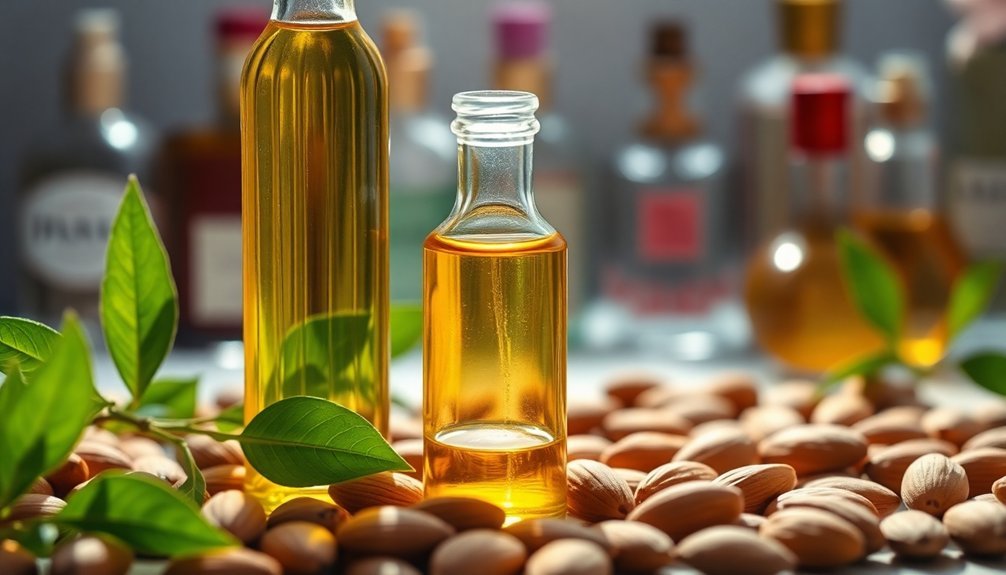
Sweet almond oil stands as one of nature's most versatile gifts to perfumery, serving both as a natural fragrance preservative and a nourishing carrier oil. You'll find this remarkable oil (CAS No. 8007-69-0) excels at stabilizing scents while providing skincare benefits. It's particularly effective when you're blending essential oils, as it helps lock in their aromatic properties.
| Feature | Benefit | Application |
|---|---|---|
| Fragrance Fixing | Extends perfume longevity | Base for custom scents |
| Skin Compatibility | No discoloration issues | Carrier oil blending |
| Slow Absorption | Enhanced scent release | Massage oil creation |
When you're creating perfumes, you'll appreciate how this oil seamlessly blends with both floral and spicy notes, rating a 9 in performance across various fragrance types. Its bland, slightly nutty aroma won't interfere with your chosen scent profile.
Fractionated Coconut Oil: A Clear Choice for Longevity
As fragrance enthusiasts seek stable and versatile carrier oils, fractionated coconut oil emerges as a premier choice for perfume creation. You'll find its indefinite shelf life particularly valuable, thanks to its complete saturation and resistance to rancidity when properly stored.
What makes this oil exceptional is its dual role as both carrier and fixative. It'll slow down the evaporation of your fragrance components while creating a layered effect that allows scents to unfold gradually on your skin.
You won't need to worry about compatibility issues either – it blends seamlessly with essential oils and absolutes.
Though you may need to reapply throughout the day, especially with lighter scents, the oil's quick absorption and moisturizing properties make it a practical choice for your perfume formulations.
Vitamin E Oil: The Natural Antioxidant Shield
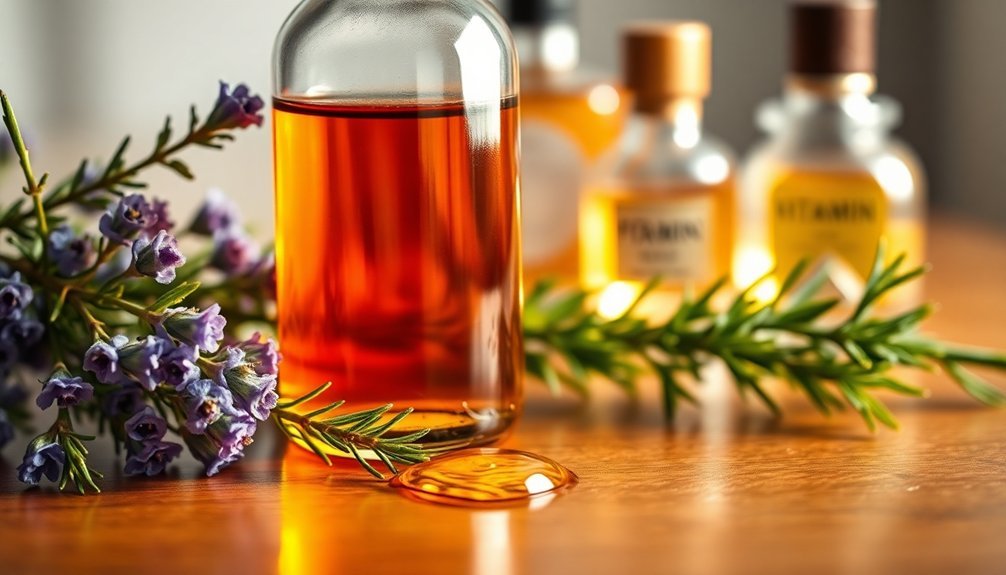
When creating perfumes with natural oils, you'll find Vitamin E oil to be an invaluable protective agent. Its powerful antioxidant properties help extend your perfume's shelf life by preventing oils from oxidizing and developing that dreaded rancid smell.
| Feature | Benefit | Usage Tip |
|---|---|---|
| Fat-soluble | Blends perfectly with oils | Add during oil phase |
| Antioxidant | Stops free radical damage | Use 0.5% concentration |
| Storage stable | Maintains fragrance integrity | Keep in dark container |
| Oil-soluble | Won't separate in blends | Mix with carrier oils |
You'll need to add Vitamin E during the oil phase of your perfume creation, as it's insoluble in water. While it can add a slight golden tint to your blend, its protective benefits far outweigh any minor color changes. Remember, it's not a preservative – it's your perfume's antioxidant shield.
Sandalwood Oil: Ancient Wisdom for Modern Perfumes
You'll discover that sandalwood oil's 4,000-year legacy in perfumery stems from its remarkable natural fixative properties and rich, woody aroma.
Beyond its ability to extend a fragrance's longevity, this precious oil offers powerful aromatherapy benefits, including stress reduction and emotional balance.
When blending perfumes, you can pair sandalwood's versatile notes with florals and amber to create complex fragrances while harnessing its ancient therapeutic wisdom.
Historical Value and Benefits
Throughout history, sandalwood oil has earned its reputation as "liquid gold" for its remarkable versatility and cultural significance. You'll find its roots in ancient Sanskrit traditions, where it was cherished for being "pleasing to the senses." From Arab perfumers to East Indian healers, this precious oil has crossed cultural boundaries.
| Benefit Category | Key Properties | Modern Applications |
|---|---|---|
| Mental Health | Stress Relief & Mood Enhancement | Aromatherapy & Meditation |
| Skincare | Anti-inflammatory & Antimicrobial | Creams & Face Masks |
| Perfumery | Long-lasting Base Note | Fine Fragrances & Colognes |
You'll appreciate sandalwood's multifaceted benefits, from its calming effects on your mind to its skin-soothing properties. Its warm, woody aroma makes it a perfect base note in perfumes, while its therapeutic qualities continue to make it valuable in modern skincare formulations.
Natural Fixative Properties
As perfumers seek to create lasting fragrances, sandalwood oil stands out as nature's premier fixative agent. Its unique molecular structure, dominated by α-santalol and β-santalol, makes up 80% of its composition and interacts directly with your skin's receptors to lock in scents.
You'll find sandalwood's fixative powers particularly evident in high-end perfumes, where it acts as a "long-distance runner" that stabilizes volatile compounds and extends fragrance life.
The oil's exceptional quality comes from a meticulous steam distillation process that takes up to 36 hours to complete. Today, Australian plantations supply 40% of the world's sandalwood oil, ensuring you've got access to this time-tested ingredient.
It's no wonder sandalwood appeared in over 600 new fragrances in 2020, making it one of perfumery's most valued natural fixatives.
Aromatherapy and Perfume Blending
While modern perfumery embraces synthetic alternatives, sandalwood oil remains a cornerstone of aromatherapy and natural perfume blending. You'll find this versatile oil serving both therapeutic and perfumery purposes, offering stress relief and skin benefits while acting as a powerful base note in fragrances.
| Benefit | Application |
|---|---|
| Stress Relief | Use in diffusers or add to bath oils |
| Skin Health | Mix with carrier oils for topical use |
| Base Note | Add as fixative in perfume blending |
| Mood Enhancement | Combine with lavender for relaxation |
When creating your own perfume blends, start with small amounts of sandalwood oil and adjust gradually. Its potent aroma requires careful dilution, but you'll appreciate how it adds depth and longevity to your compositions. Remember to consult a professional before applying directly to your skin, especially if you're pregnant or have sensitive skin.
Benzoin Resin: The Traditional Fragrance Extender
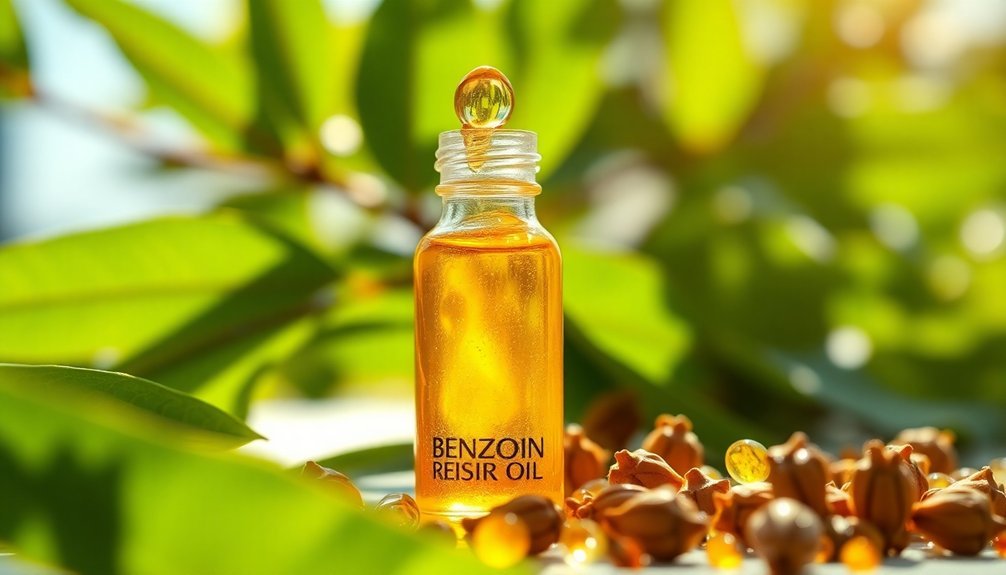
Benzoin resin, derived from trees in the Styrax genus, stands as one of perfumery's most cherished fixatives.
You'll find two main varieties: Siamese benzoin, which offers a lighter, more delicate scent, and Sumatra benzoin, with its distinct aromatic profile.
This vanilla-like resin works wonders in extending your perfume's longevity. It's particularly effective when dissolved in ethanol, making it perfect for natural perfumery.
You can use it to add depth to woody scents or create smoky, sacred notes in your fragrances.
Beyond its fixative properties, benzoin resin offers natural preservation benefits. It's packed with antibacterial and antioxidant properties that help prevent your perfume from spoiling.
When you're creating natural perfumes, add benzoin at a rate of 1/2 to 1 teaspoon per pound of oils for ideal results.
Vanilla Bean-Infused Oils: Sweet Scent Preservation
Sweet and complex, vanilla-infused oils offer another natural approach to perfume preservation.
You'll need to choose a carrier oil like jojoba, sweet almond, or fractionated coconut oil as your base. If you're using whole vanilla beans, split them lengthwise to expose their fragrant seeds before combining them with your chosen carrier oil.
Store your mixture in a dark glass container for at least a week, shaking it daily to encourage infusion. You can enhance the scent by adding complementary essential oils like lavender or bergamot.
Don't forget to include vodka or witch hazel as a fixative – mix equal parts with your strained vanilla oil. Let your perfume mature for another week to develop its full complexity.
When stored properly in amber bottles, your vanilla-infused perfume will stay fresh for several months.
Strategic Oil Blending for Maximum Shelf Life
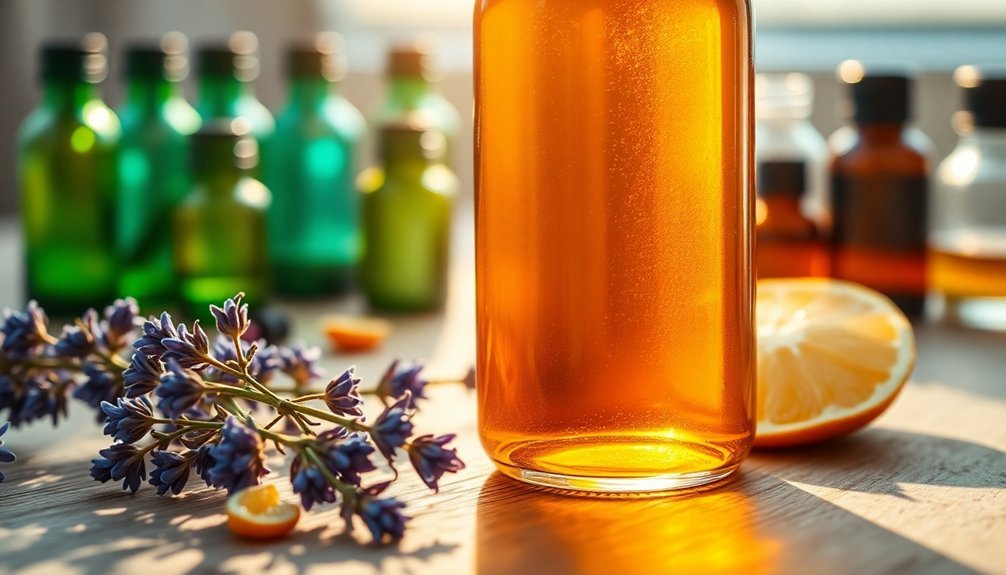
To maximize the shelf life of your blended perfume oils, proper storage and handling techniques are essential from the moment you begin mixing.
Store your blends in dark glass bottles at consistent temperatures between 15-21°C, away from direct sunlight and heat sources. You'll want to maintain moderate humidity levels around 50-60% while keeping your oils in cool, dark spaces.
- Transfer your blends to smaller 10ml bottles for daily use, keeping the main supply sealed
- Choose cobalt blue, green, or amber glass containers with tight-fitting caps
- Store bottles upright and wipe the openings clean to prevent oxidation
- Apply oils to pulse points using a dabbing motion rather than rubbing
Remember to keep your blends away from bathrooms and kitchen areas where temperature and humidity fluctuate frequently, as this can degrade your precious fragrances.
Frequently Asked Questions
Can Natural Oils Affect the Original Scent Profile of My Perfume?
Yes, natural oils can alter your perfume's original scent profile. When you mix oils with your fragrance, they'll interact with both your skin chemistry and the perfume's compounds, creating a unique, personalized blend.
How Often Should I Rotate Between Different Natural Oils for Preservation?
You don't need to rotate between different natural oils. Instead, focus on proper storage conditions – keep your oils in cool, dark places with airtight seals. Rotation won't affect preservation quality or longevity.
Do Natural Oils Work Equally Well With Synthetic and Natural Perfumes?
You'll find natural oils work effectively with both types, but they're particularly compatible with natural perfumes. When paired with synthetics, they can help stabilize the blend while maintaining the fragrance's intended character.
What's the Ideal Temperature for Storing Perfumes Mixed With Natural Oils?
You'll want to store your oil-mixed perfumes between 60-70°F (15-21°C) for ideal preservation. Don't let temperatures drop below 50°F or rise above 75°F, as this can damage both the oils and fragrances.
Can Mixing Multiple Natural Oils Reduce Their Preservation Effectiveness?
Yes, mixing multiple natural oils can reduce their preservation effectiveness. You'll need to carefully consider chemical compatibility, as some combinations may destabilize each other, leading to faster degradation and altered scent profiles over time.
In Summary
You'll find that incorporating natural fixative oils into your perfumes is a game-changer for extending their lifespan. Start with jojoba as your base, then experiment with combinations of sweet almond, fractionated coconut oil, and vitamin E. Don't forget traditional fixatives like sandalwood and benzoin resin. With these natural oils, you'll create longer-lasting fragrances while keeping your scents pure and chemical-free.

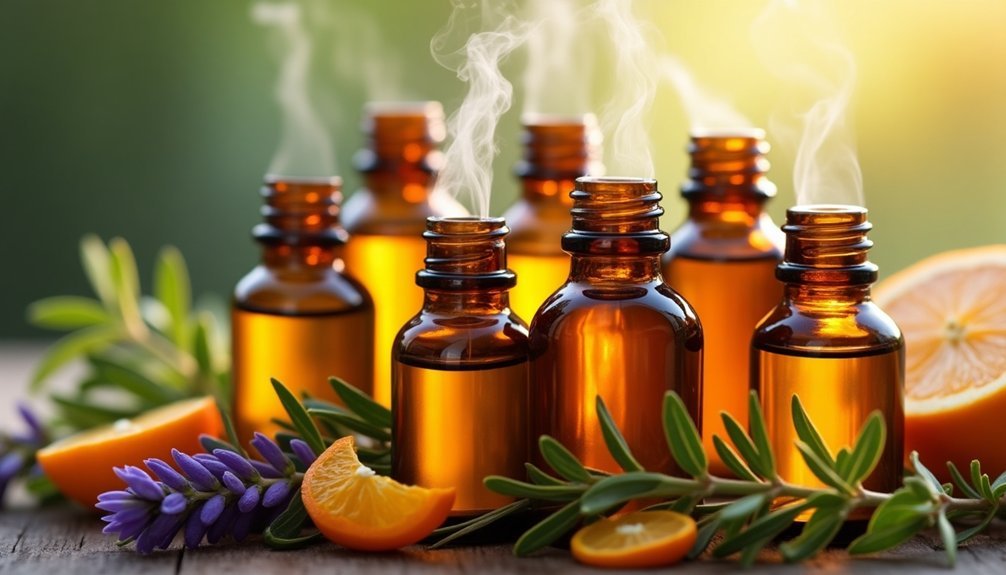



Leave a Reply